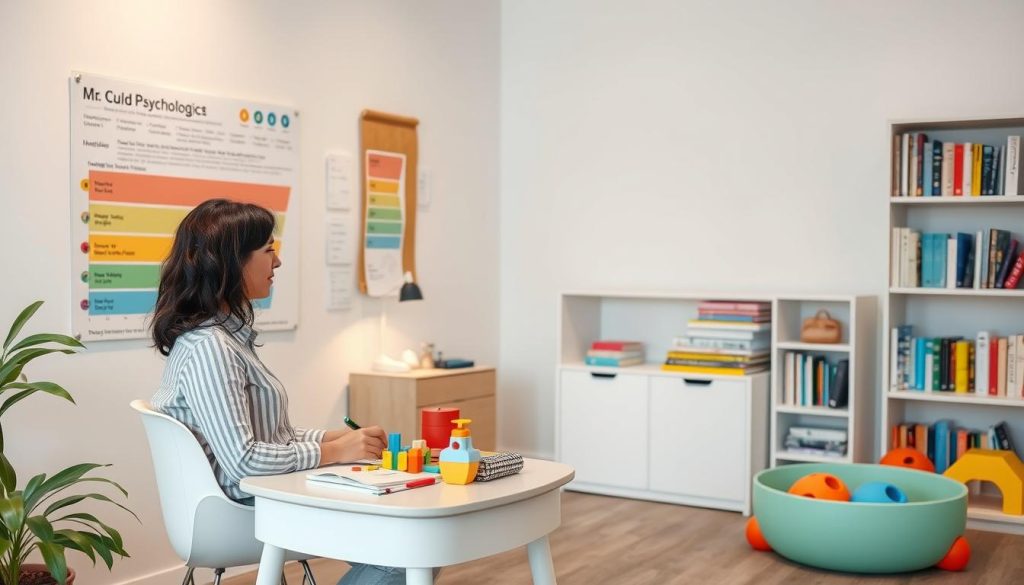Getting an autism diagnosis can feel overwhelming. It’s natural to have questions about the autism diagnosis process and the autism specialists involved. This guide will help you navigate the journey of identifying autism spectrum disorders.
Autism diagnosis requires a team of skilled professionals. From developmental pediatricians to child psychologists, each expert plays a key role. They work together to provide a thorough evaluation, ensuring accurate diagnosis and support.
Understanding who diagnoses autism is the first step towards getting the right help. Let’s explore the key players in the autism diagnosis process and how they contribute to identifying and supporting individuals on the autism spectrum.
Understanding the Journey to Autism Diagnosis
Spotting early signs of autism is vital for a child’s growth. Parents often see small changes in their child’s actions, words, or how they interact with others. These signs start the path to understanding and support.
The Importance of Early Detection
Finding autism early is critical for early help. Autism tests can spot signs as early as 18 months. These tests check on developmental steps, how a child talks, and their social skills.
Common Parental Concerns and First Steps
Parents might see their child not reacting to their name, not making eye contact, or doing the same things over and over. If you’re worried, talk to your doctor. They can help with first tests and send you to experts if needed.
Timeline of Typical Diagnosis Process
The autism diagnosis process has several steps:
- Initial screening during regular check-ups
- Comprehensive evaluation by specialists
- Developmental and behavioral assessments
- Final diagnosis and treatment planning
This journey can take months because detailed checks are needed for a correct diagnosis. Remember, every child’s path is different. Early help can greatly improve their growth and life quality.
Who Diagnoses Autism: Key Healthcare Professionals
Diagnosing autism spectrum disorder needs a team of skilled professionals. Autism specialists work together to check a child’s behavior, development, and communication skills.

Developmental pediatricians are key in the diagnosis. They specialize in child development and spot early signs of autism. They look at a child’s growth, behavior, and learning abilities.
Child psychologists also play a big role. They check a child’s thinking, emotions, and social skills. Their knowledge helps paint a full picture of the child’s abilities.
- Speech-language pathologists evaluate communication skills
- Occupational therapists assess sensory processing and motor skills
- Neurologists may check for related medical conditions
This team works together for a detailed evaluation. Their collaboration ensures an accurate diagnosis and a good treatment plan. Parents should ask questions and share their concerns with these experts.
The Role of Developmental Pediatricians
Developmental pediatricians are key in spotting autism spectrum disorders. They focus on kids’ growth and behavior. This makes them perfect for checking for autism.
Specialized Training and Expertise
These doctors get a lot of training in child development and behavior. They can spot autism signs that others might miss. Their skills help in making accurate diagnoses and treatment plans.
What to Expect During Your Visit
At your visit, a developmental pediatrician will do detailed autism tests. They might:
- Watch how your child acts
- Check their language and communication
- Look at their thinking skills
- Go over their health history
The doctor will also talk about your worries and your child’s growth steps.
Follow-up Care and Monitoring
After finding out about autism, these doctors keep an eye on your child. They change treatment plans and work with other experts. Regular check-ups help your child get the best care as they grow.
| Service | Frequency | Purpose |
|---|---|---|
| Progress Evaluation | Every 3-6 months | Check how they’re growing |
| Treatment Adjustments | As needed | Make treatment better |
| Referrals | Ongoing | Help find more services |
Child Psychologists and Their Diagnostic Approach
Child psychologists are key in diagnosing autism. They use various methods to check a child’s behavior, communication, and growth. These experts are trained to find small signs that might show autism spectrum disorder.

The process starts with observing the child in different places. They look for patterns in how the child acts, talks, and plays. This helps them understand the child’s social skills and any repetitive actions.
Then, they give the child standardized tests to check on development. These tests are part of the autism diagnostic criteria. They measure the child’s thinking, language, and ability to adapt.
Next, they talk to parents or caregivers about the child’s past. This is important because it gives context to the child’s current actions. It also helps spot early signs of autism.
After gathering all this info, child psychologists study it carefully. They compare the child’s actions and test results to autism criteria. This detailed method helps make sure the diagnosis is right. It also guides the best ways to help each child.
Understanding the Multi-Disciplinary Assessment Team
Getting an autism diagnosis needs a detailed look. A team of experts works together for a complete check-up. This team has different skills, making sure the diagnosis is accurate.
Speech and Language Pathologists
Speech and language pathologists are key in autism tests. They check how well a child talks and communicates. They look at language growth, speech, and how they connect with others.
Occupational Therapists
Occupational therapists focus on how a child handles their senses and moves. They see how a child interacts with their world and does everyday tasks. This helps spot any sensory or motor issues linked to autism.
Behavioral Specialists
Behavioral specialists study a child’s actions and how they react. They watch for repeating behaviors, social interactions, and how they handle emotions. Their findings help understand the child’s behavior fully.
This team’s combined knowledge gives a full picture of a child’s growth. Their work leads to a correct diagnosis and the right help. Learning about the assessment process helps parents better understand their child’s journey.
Comprehensive Autism Evaluation Methods
Autism assessment tests use many methods to understand a child’s development fully. These approaches help meet the autism diagnostic criteria. They ensure a detailed evaluation.

Behavioral Observations
Experts watch a child’s behavior in various settings. They look for signs like limited eye contact or repetitive actions. These observations help spot behaviors that match autism diagnostic criteria.
Developmental Assessments
Developmental assessments are key in autism tests. They check a child’s skills in communication, social interaction, and thinking. Professionals use special tools to compare a child’s development to typical milestones.
Parent Interviews
Parents are very important in the evaluation process. They share insights into their child’s behavior and growth history. Professionals ask about milestones, concerns, and daily routines to get important information for the diagnosis.
By mixing these methods, healthcare professionals get a full picture of a child’s abilities and challenges. This way, they can make accurate diagnoses and create the right support plans.
Diagnostic Tools and Screening Instruments
Autism screening tools and assessment tests are key in spotting autism spectrum disorders. They help experts collect important info on a child’s growth and actions.
These tools vary in type. Some are questionnaires for parents or caregivers. Others involve watching the child directly. They check on social skills, talking, and habits.
Some well-known autism tests are:
- Modified Checklist for Autism in Toddlers (M-CHAT)
- Autism Diagnostic Observation Schedule (ADOS)
- Autism Diagnostic Interview-Revised (ADI-R)
- Social Communication Questionnaire (SCQ)
Each test has its own role in figuring out if a child has autism. For instance, the M-CHAT is for toddlers, while the ADOS needs a pro to watch the child.
| Test Name | Age Range | Format | Duration |
|---|---|---|---|
| M-CHAT | 16-30 months | Parent questionnaire | 5-10 minutes |
| ADOS | 12 months – adult | Observation | 40-60 minutes |
| ADI-R | 2 years – adult | Parent interview | 1.5-3 hours |
| SCQ | 4 years and up | Parent questionnaire | 10-15 minutes |
It’s key to remember these tools aren’t the only answer. They help experts, but a full check-up looks at more than just test scores.
The Role of Educational Professionals in Diagnosis
Educational professionals are key in spotting autism in school kids. They see signs that might not be noticed elsewhere. This is because they work with students every day.
School Psychologists
School psychologists are often the first to look into a child’s behavior and learning. They watch, test, and work with teachers. This helps them understand a student’s strengths and challenges.
Special Education Teachers
Special education teachers work with students who might have autism. They know a lot about different learning needs. This helps them spot signs of autism and share their findings with autism centers.

Educational Evaluations
Educational evaluations are important in diagnosing autism. They look at a child’s school work, social skills, and behavior. This gives autism specialists a full view of a child’s development.
| Professional | Role in Autism Diagnosis | Key Contributions |
|---|---|---|
| School Psychologist | Initial Assessment | Behavioral observations, cognitive testing |
| Special Education Teacher | Classroom Insights | Learning patterns, social interaction reports |
| Educational Evaluator | Comprehensive Assessment | Academic performance analysis, developmental screening |
Finding the Right Diagnostic Center
Choosing the right autism evaluation center is key for a correct diagnosis. Start by looking into well-known centers near you that focus on autism tests. Make sure they have experts who know how to diagnose autism and have a good history with developmental issues.
Think about the center’s location, how long you’ll wait, and if they take your insurance. Some places offer more than just tests. They also help with ongoing care and planning for treatment. This is great for families looking for ongoing support.
Before your first visit, collect any important medical records and write down any behaviors you’ve noticed. This info will help the team at the center do a detailed check-up.
- Research centers with expertise in autism diagnosis
- Check waiting times and insurance coverage
- Prepare documentation and observations for the evaluation
Finding the right autism evaluation center might take some time. But it’s a vital step for your child’s support. Don’t be shy to ask about their approach and experience with autism spectrum disorders.
Insurance Coverage and Diagnostic Costs
Understanding the financial side of getting an autism diagnosis can be tough. Many families are concerned about the costs of evaluations at autism centers. It’s important to know your insurance options and what financial help is available.
Private Insurance Options
Most private health insurance covers autism screenings and evaluations. Check your policy or call your insurance to see what’s covered. Some plans might need you to get approval first or have limits on visits.
Government Assistance Programs
If you don’t have private insurance or need more help, government programs can assist. Medicaid often covers autism evaluations and treatments fully. The Children’s Health Insurance Program (CHIP) helps low-income families too.

Financial Resources and Support
Many organizations offer financial aid for autism evaluations. Look into grants from autism groups or local charities. Some centers offer fees based on your income. Always ask about payment plans or discounts when you book your appointment.
| Resource Type | Examples | Potential Benefits |
|---|---|---|
| Private Insurance | Employer-provided plans, ACA marketplace plans | Coverage for evaluations, possible treatment coverage |
| Government Programs | Medicaid, CHIP | Comprehensive coverage, low or no cost to families |
| Financial Assistance | Autism Society grants, local charities | Help with out-of-pocket expenses, reduced evaluation costs |
Preparing for Your Diagnostic Appointment
Preparing for an autism diagnostic appointment can be tough. Being ready helps you get the most out of this key meeting. Here’s how to prepare for success.
Start by gathering important documents. You’ll need medical records, school reports, and notes on your child’s behavior. Also, list any medications your child is taking. Keep a journal of your observations to share with the specialist.
Learn about common autism assessment tests and screening tools. Knowing about these will help you understand the process. Prepare questions about these tests and what they measure.
- Bring comfort items for your child
- Pack snacks and drinks
- Plan to arrive early to reduce stress
Be ready for a long appointment. Autism evaluations can take several hours. You’ll need to answer detailed questions about your child’s development and current behaviors.
| Items to Bring | Purpose |
|---|---|
| Medical records | Provide health history |
| School reports | Show academic performance |
| Behavior journal | Share detailed observations |
| Comfort items | Keep child calm during assessment |
Remember, this appointment is a step towards understanding your child better. Stay positive and open-minded throughout the process.
Understanding Diagnostic Results and Next Steps
Getting an autism diagnosis can feel overwhelming. But, it’s just the start of your journey. Let’s explore what’s next to guide you on this path.
Reading Assessment Reports
Assessment reports might seem complex, but they’re vital. They show the autism diagnostic criteria and early signs of autism. Take your time to read them and ask your healthcare provider to explain any confusing parts.
Treatment Planning
After understanding the results, it’s time to plan treatment. This plan will be made just for your child. It might include therapies, educational support, and help with daily skills.
Support Services Navigation
Many support services are out there for families with autism. You can find early intervention programs, special education services, and community groups. Recognizing early signs of autism and getting help can greatly benefit your child.
FAQ
Q: Who is qualified to diagnose autism?
A: Several healthcare professionals can diagnose autism. This includes developmental pediatricians, child psychologists, and child psychiatrists. Neurologists also play a role. Often, a team of specialists works together for a full assessment.
Q: At what age can autism be diagnosed?
A: Autism can be diagnosed as early as 18 months. But, most diagnoses happen around age 2 or 3. Some children might not be diagnosed until they’re older, if their symptoms are less obvious.
Q: What does the autism diagnosis process involve?
A: The process includes several steps. First, there’s a screening. Then, a full evaluation and assessment follow. This might include watching the child’s behavior, developmental tests, interviews with parents, and standardized tests.
Q: How long does it take to get an autism diagnosis?
A: Getting a diagnosis can take different amounts of time. Initial screenings are quick. But, a full evaluation can take hours over several visits. From first concerns to diagnosis, it can take weeks or months.
Q: What are some early signs of autism?
A: Early signs include delayed speech and not making eye contact. Not responding to their name and repetitive behaviors are also signs. Each child’s symptoms can be different.
Q: Are there specific autism screening tools used by professionals?
A: Yes, professionals use tools like the M-CHAT, ADOS, and ADI-R. These help identify autism.
Q: What’s the difference between a developmental pediatrician and a regular pediatrician?
A: Developmental pediatricians focus on child development and disorders like autism. They have extra training. Regular pediatricians deal with general child health.
Q: How do I find an autism evaluation center near me?
A: To find an evaluation center, ask your pediatrician for a referral. You can also contact local autism organizations or search online. Many children’s hospitals have autism clinics.
Q: Does insurance cover autism diagnosis?
A: Many insurance plans cover autism diagnosis. But, coverage can differ. It’s wise to check with your insurance about autism assessment coverage and costs.
Q: What should I bring to an autism diagnostic appointment?
A: Bring any medical records, school reports, and notes about your child’s development. Also, make a list of your concerns and questions for the healthcare provider.


















